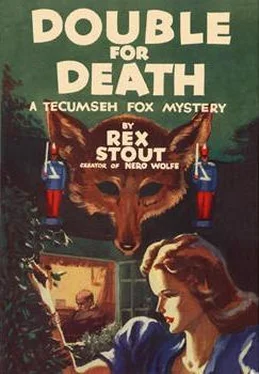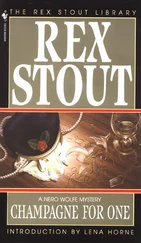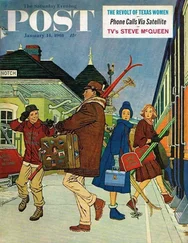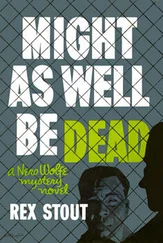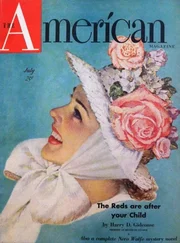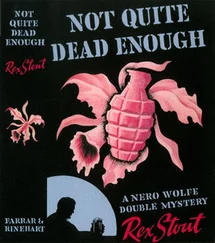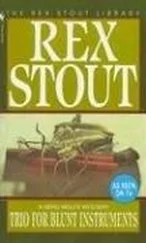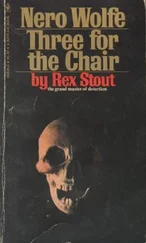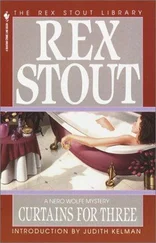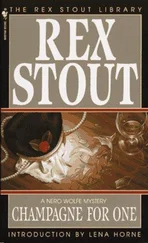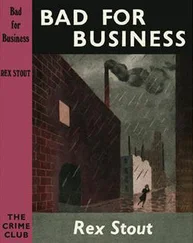“We were pretty lucky on that. What direction did the sound come from? I mean the shot.”
“I don’t know. Of course I’ve reflected on it and have been questioned. I can’t say.”
“Did it sound as if it were fired in the open or in a confined space? Outdoors or in the house?”
“I can’t say that either. I’ve never heard a shot fired in a house. It sounded loud and close by.”
“Was there any smoke in the side hall? Or a sour smell? You know the smell.”
“I didn’t notice any. Colonel Brissenden says that the position of the body indicates that the shot was fired from the direction of the French windows.”
“Maybe and maybe not. He might have done a spin after it hit him. Who got there first after you?”
“Grant did. Then Bellows, and after him Brissenden. Then one of the gardeners came in through the French windows and Henry Jordan was right behind him. After that I don’t know, they came in a rush from all directions.”
“Was that blue scarf there on the floor when you first entered?”
“I don’t know when I saw it first. I didn’t even see the gun until I saw Grant looking at it and Brissenden telling him not to touch it— Speaking of guns, I’d like to ask a question.”
Fox nodded at the colorless eyes that looked as if nothing would ever make them blink. “Go ahead.”
“Who told you that the gun that killed Arnold was found in the library safe?”
“Derwin.”
“It’s incredible. Absolutely incredible. Do you suppose there’s any chance that he planted it there?”
“No. None of them. They found it there all right. Who has the combination of the safe?”
“Mr. Thorpe and I, and that’s all. That’s why I say it’s incredible. I haven’t opened it for over a week until this morning, to get the checkbook. I know I didn’t put that gun in there and to suppose that Mr. Thorpe did...”
“He must have.”
“He couldn’t have. Where did he get it?”
“I don’t know. According to Derwin and Brissenden, I got it and gave it to him, and that’s what he paid me that check for. They call it a strong inference, which shows how careful you have to be with inferences. Nothing would be easier, for instance, than to build up a strong inference that it was you who killed both Thorpe and Arnold. Sunday night you sneaked out of the Green Meadow Club, drove to the bungalow, fired through the window and were back at the clubhouse in bed by the time the police phoned to notify you. Your motive was obvious. You knew that Thorpe Control would drop forty points or more at the news of Thorpe’s death and jump back up again at the news he was alive. If you could swing a buy of, say ten thousand shares, that would make a profit of four hundred thousand dollars. Not bad at all. That’s why you didn’t make an effective search for Thorpe on Jordan’s boat Monday morning, to allow time for the market—”
Kester’s expression had exhibited no change whatever, but he interrupted indignantly: “He wasn’t on Jordan’s boat! I went straight to the cottage where he was!”
“Sure.” Fox nodded. “I know that, but the police don’t. I’m building up an inference for them. But even for me that doesn’t weaken it any. You went straight to Thorpe and stayed right with him, to make sure he wouldn’t disclose himself too soon. You were sure he wouldn’t anyway, knowing as you did how devoted he was to his reputation.”
Kester’s lips were twisted again for their substitute for a smile. “And then,” he said sarcastically, “I carried the gun around in my pocket for two days and put it away in Mr. Thorpe’s safe.”
“Oh, no. That would have been dumb. Somehow — this is a detail to be cleared up — Thorpe got hold of the gun and knew it was yours, and threatened to turn you over to the police. We have to have it that way to give you a motive for killing Thorpe. When you returned to the library after turning Brissenden over to Bellows, you stepped outside the French windows, fired from there, entered the house by the side hall, fell down to pretend you had tripped on the rug if any one appeared at that moment, got up and reentered the library, and yelled for me. As it happened, you see, your yelling for me wasn’t a compliment at all, it was an insult. I resent it!”
“You can’t possibly—” Kester’s blue eyes were staring wide. “You can’t — why — it was your gun that shot him! Where did I get your gun?”
“Just a detail.” Fox waved it aside. “That and Miss Grant’s scarf, which you used to protect your hand from powder marks. If this were anything but an idle inference, little things like that wouldn’t trouble us much.”
“I thought,” Kester observed stiffly, “that you said we had a lot of ground to cover. You told Mrs. Pemberton it was urgent. If you wish from me a categorical denial that I am guilty of murder, you may have it. I am not. I am here to answer your questions at the request of Mrs. Pemberton—”
“All right,” Fox conceded. “No more idle inferences. Let’s have some facts. What about that bunch of directors and vice-presidents? Do they alibi each other? Were they in a huddle somewhere when they heard the shot?”
“I don’t know, except McElroy. He told me he was in the bathroom on the other side of the music room. I don’t know where the others were, but I suppose they were together, since Derwin let them go back to town.”
“Probably, but we won’t forget they were here.” Fox pulled at his ear. “There was something— Oh, yes. That threatening letter Thorpe received, which I returned to him this morning. Had you seen it before?”
“Certainly. I open his personal mail.”
“You read that even before he did, then?”
“Yes.”
“Did anything about it strike you as odd?”
“Odd? Certainly. The whole thing — I would certainly call it odd.”
“No, I mean something special. Some particular detail.”
Kester shook his head. “No. No particular detail. What do you mean?”
“We’ll pass it for the moment. Where were you born?”
“I fail to see,” said Kester dryly, “any connection between an oddity in a threatening anonymous letter received by Mr. Thorpe and the place of my birth. I was born in Salisbury, Vermont.”
“Where did you go to school?”
Kester stood up. “This is absurd. I am perfectly willing to furnish any information that may be helpful, since Mrs. Pemberton asked me to, but these inane and irrelevant—”
“You’re wrong,” said Fox curtly. “Please sit down. These are the questions I wanted to ask Thorpe as soon as I read that letter yesterday. Now he’s dead and I have to ask you. I’m not going to tell you why they’re relevant, but you can take it from me they are. Where did you go to school?”
Kester was frowning. “Do you mean this?”
“I do.”
He sat down. “I attended public school at Salisbury to the tenth year. My family moved to Springfield, Massachusetts, and I got the last two years of high school there. I then went to Dartmouth and graduated in four years.”
“Have you spent any time in Canada?”
“None.”
“Been abroad?”
“Once, in the summer of 1929, for two months.”
“Thank you very much. Do you happen to know where Luke Wheer was born?”
“Yes. Macon, Georgia. His people still live there. Mr. Thorpe sent them a gift every Christmas.”
“He was a remarkable man. Since Luke was with Thorpe for over twenty years, he couldn’t have spent much time in — the British Isles, for instance. Could he?”
“Very little. He has been there a few times with Mr. Thorpe on short trips.”
“But not every year for the shooting or anything like that.”
“Oh, no.”
Читать дальше
